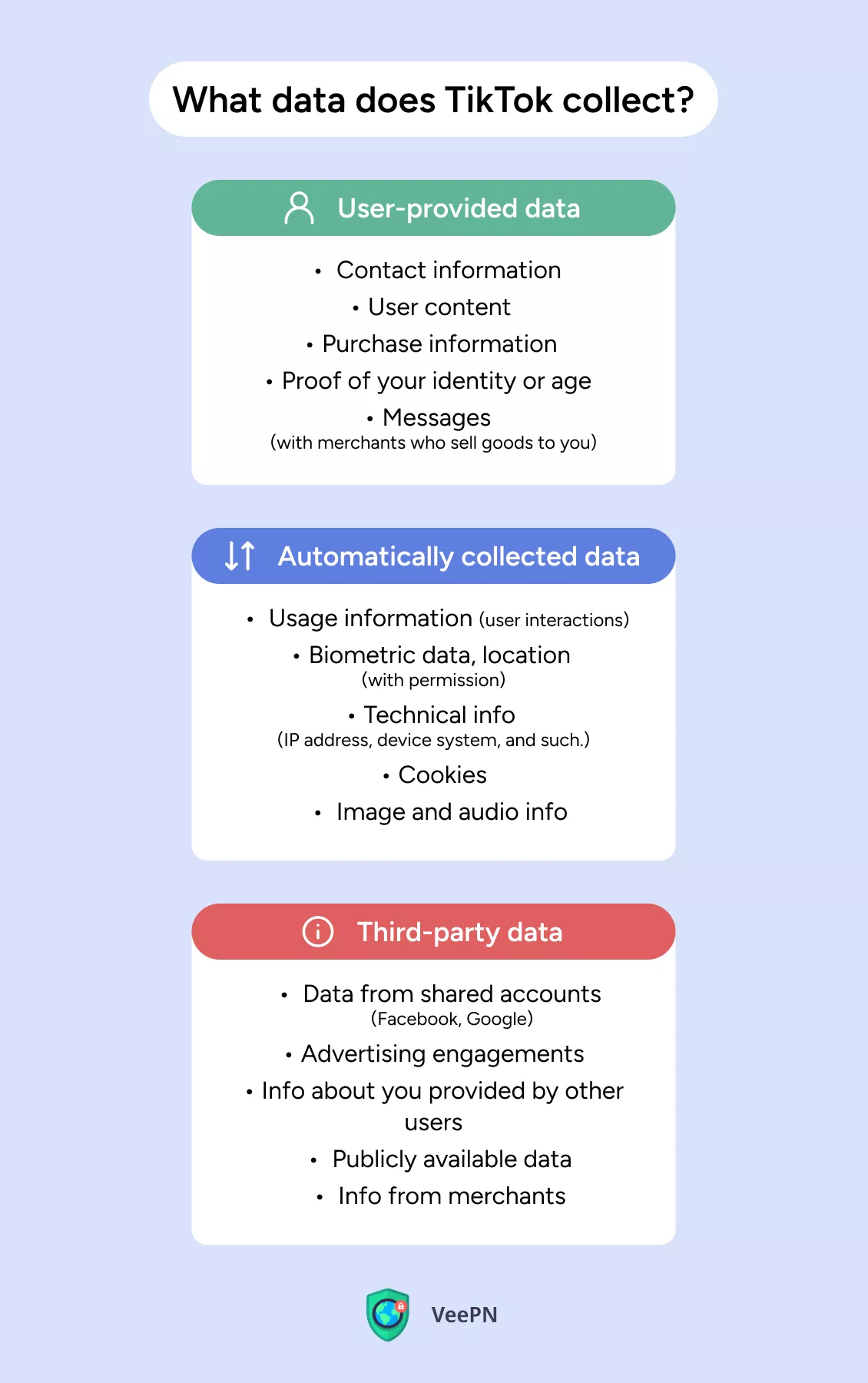Is TikTok Safe? Exploring TikTok Privacy Risks and Concerns
TikTok caters to a wide audience, offering social media trends, celebrity updates, and creative showcases. But like with any social media, there are risks to consider. And those seem to be even more serious due to TikTok privacy and security concerns circling around. IIs TikTok spyware? Is TikTok safe to use? Why is it banned in some countries? Is it similar to other social media platforms? Read along to find the answers to all burning questions.

Is TikTok safe to use?
First, let’s be real — no social media platform is truly safe and private. They are a goldmine for scammers. In 2021, over 25% of fraud victims mentioned that the scam began with a social media ad, post, or message. For scammers, social media is a low-cost way to reach potential victims from anywhere in the world.
As for TikTok safety, the app is generally safe and doesn’t contain malware, yet there are risks involved despite TikTok safety measures it adopts to protect you.
TikTok privacy
Second, while the app itself isn’t malicious, does it come with any privacy issues? Let’s break it down:
- Social media sites are inherently more invasive of users’ privacy than other websites, raising questions about TikTok safety.
- TikTok collects the same (vast) amount of user data as Facebook/Meta and other platforms.
- It gathers data about your online and offline actions, such as your location, the websites you visit, and the links you click on.
Besides, like many other U.S. tech companies, TikTok collects a significant amount of data from users both within the app and through trackers on external websites. This enables them to create profiles and deliver targeted ads by combining your app data with your online activities.
What personal information does TikTok collect?
Now onto details — that is, TikTok’s privacy policy which divides user data they collect in three categories:
- User-provided data: Data you willingly share.
- Automatically collected data: Stuff TikTok picks up as you use the app.
- Third-party data: Data from other sources.
So, here’s what TikTok might gather from you in more detail (and once again, it’s not very different from what big names like Twitter/X or Facebook do):

Pro tip: Want to boost your online privacy? Encrypt your data and hide your IP address using a VPN. Grab a VPN service like VeePN to get started. VeePN uses strong AES-256 encryption to safeguard your data and has servers in 60 countries worldwide, letting you change your virtual location for content access. Check out the benefits you get.
The Washington Post had the privacy company Disconnect’s CTO, Patrick Jackson, examine the app. He concluded that TikTok doesn’t gather more data than Facebook, but it does try to hide its collection methods.
Does TikTok share data?
Considering how much they know about users, it’s natural to ask if TikTok uses and shares data. TikTok does admit to sharing some data with these third parties:
- Business partners: Platforms like Facebook, Twitter, and Google can see certain TikTok data, like app ID and access tokens.
- Service providers: Third-party services help TikTok run, like cloud services and content moderation.
- Payment providers: Those who handle your TikTok transactions see some purchase records.
- Analytics providers: Services analyzing TikTok data can access relevant information.
- Law enforcement: If needed by law, TikTok shares data with authorities.
- Advertisers: TikTok works with advertisers for analytics and targeted ads.
While that’s still a lot of personal info TikTok collects and shares, it’s not necessarily more risky than other popular platforms such as Likee and Instagram. But policymakers beg to differ, pushing for the TikTok ban. Here’s why.
TikTok privacy concerns: Claims against the company and bans
In past years, TikTok encountered blocks and restrictions in various countries, largely due to content concerns such as promoting blasphemy and explicit material. However, since 2019, more countries and organizations have raised apprehensions about TikTok. Those are primarily related to issues of propaganda, censorship, security, data collection, and other dangers of using TikTok as the platform expanded rapidly.
This led to the following major investigations and legal issues:
- Feb 27, 2019: TikTok paid $5.7M to FTC for unlawfully gathering names, email addresses, pictures, and locations of children under 13 years old. App barred under-13, but many still used it.
- Nov 27, 2019: California lawsuit claimed TikTok took data, sent to China without consent.
- Dec 12, 2019: $1.1M settlement for collecting kids’ data in Musical.ly era.
- Apr 30, 2020: Illinois minors’ lawsuit over biometric data without consent.
- June 10, 2020: The European Data Protection Board formed a task force to evaluate TikTok’s privacy and security risks, along with its data collection practices. Outcomes of the assessment are pending publication.
- Jul 15, 2020: Korea fined TikTok $156,000 for under-14 data collection without guardian consent, overseas transfer failure.
- In 2021, ByteDance settled over twenty data collection lawsuits for $92 million.
- In August 2023, European Union data privacy regulators revealed intentions to fine TikTok £12.7 million (around $16.2 million) for not following EU rules on processing data from children under 13.
TikTok privacy concerns: Geopolitical edition
Note: Although TikTok is officially based in Singapore, with the user data stored on Singaporean and US servers, its parent company ByteDance Ltd. is China-based. The connections to China are the primary cause of the controversies related to the app.
TikTok’s data collection practices don’t differ much from other social media apps, but TikTok privacy concerns have been circling around for quite some time due to belief that TikTok and its parent company ByteDance may put sensitive user data into the hands of the Chinese government. This controversy led to the following events:
- Nov 18, 2019: Senator Josh Hawley introduced the National Security and Personal Data Protection Act to curb sensitive data flow to China. TikTok, tied to China, was a focus. Bill limits data transfers, usage, and more.
- Dec 30, 2019: US Army banned TikTok on government phones as a cyber threat. The US Navy did the same on Dec 21. Similar bans by Australia’s Defence Department.
- Jun 29, 2020: India permanently banned TikTok, citing sovereignty threat. App temporarily suspended due to content issues. 30% of TikTok’s downloads were in India.
- Jul 31, 2020: President Trump ordered ByteDance to divest TikTok ownership; Microsoft in talks for acquisition.
- Aug 6, 2020: US announced plans to limit Chinese firms in tech areas (“clean network”).
- In 2021, TikTok started working on Project Texas — the plan to move all user data outside China.
- In March 2023, The RESTRICT ACT was introduced in the US government — the legislation seeks to limit access to certain apps and websites (including TikTok) deemed harmful to national security.
- As of 2023, TikTok is banned on government devices in the US, Australia, France, Britain, and other countries in Europe.
Despite TikTok stressing its independence from China (the app is unavailable in Mainland China), lawmakers remain skeptical and plan to move forward with the bill for the outright ban of the app.
Still, even with numerous bans, there’s no concrete evidence of TikTok spying on users. While bans in sensitive sectors, like the military, make sense, they don’t confirm spying. Countries with prominent bans also have strained ties with China, suggesting possible political motivations rather than solely evidence-based decisions.
TikTok’s a security risk? Key takeaways
So, should regular people use TikTok? If you worry about privacy, TikTok might not be for you. It does collect huge chunks of data with no 100% guarantee that it won’t end up compromised. However, this concern applies to many other companies. For example, if you use platforms like Instagram, TikTok offers similar privacy. It is not safer, but not riskier either.
Does this mean you should avoid being cautious with your data and not take measures to secure it? Absolutely not. Think of it like securing your home with a security system – while TikTok may be generally safe, being on your guard is wise especially because of some users out there with malicious intentions.
Note: TikTok privacy and security seem insufficient for you? Learn how to delete your TikTok account.
How to secure your TikTok account
Here are some tips to stay safer on TikTok. These steps are useful for other social media sites and websites too.
- Avoid oversharing: Don’t share sensitive personal info like your birthday, personal email, or home address.
- Set privacy restrictions: Use TikTok’s privacy settings to control who can view, comment, and share your posts.
- Keep your account private: Switch to a private account to limit your posts to followers only and decline requests from strangers. Go to Settings and privacy by tapping the three-line menu in the top left corner of your profile. Choose Privacy and toggle on a Private account.
- Enable two-step verification: Add an extra layer of security by requiring a code from your phone or email to log in. In Settings and privacy, choose Security and toggle on 2-step verification.
- Turn off ad personalization: TikTok gathers your interests and online actions for tailored ads, which can feel invasive. To halt this:
- Go to your TikTok profile.
- Tap the three-line menu in the top left corner and select Settings and Privacy.
- Scroll down, choose Ads, and toggle off Using Off-TikTok activity for ad targeting.
- Use unique passwords: Avoid using the same password for different accounts to protect against hacks.
- Use a VPN: Safeguard your online identity by using a Virtual Private Network to encrypt (read protect) your data and hide your IP address from advertisers and others who might track you.
Protect your personal info on TikTok with VeePN
It’ll encrypt your data, shielding your location, IP address, and other sensitive details and web activity from apps. VeePN offers easy-to-use intuitive mobile apps for Android and iOS, apps for desktop, smart TVs and browser extensions. Download VeePN to your device, try the service risk-free, and keep your personal info as it should be — private!
Remember, while TikTok offers great content and networking, it’s important to be aware of potential risks. By following these precautions with VeePN by your side, you can enjoy TikTok with just a bit more peace of mind. Stay safe out there.
FAQ: Is TikTok a Threat to Your Privacy?
No, TikTok is not a spy app. However, concerns have been raised about its data practices and potential risks related to privacy. Learn more in this article.
Yes, you can use a VPN (Virtual Private Network) while using TikTok. A VPN can help protect your online privacy by masking your IP address and encrypting your data. But keep in mind that TikTok’s terms of service and community guidelines still apply. So if some action is illegal without using a VPN, it will also be illegal with its use.
Using a VPN itself won’t lead to a ban on TikTok. However, TikTok’s algorithms might detect unusual activity, such as frequent location changes, which could trigger security measures. That’s why it’s important to go for a reliable VPN provider with great infrastructure. Find out more in this blog post.
TikTok has safety features like parental controls and privacy settings, but it still exposes kids to potential risks like inappropriate content, online predators, and data privacy concerns. The app collects a significant amount of user data, which raises concerns about how it’s used and stored. Parents should enable safety settings, monitor usage, and educate kids about online risks to make TikTok safer for them.
VeePN is freedom
Download VeePN Client for All Platforms
Enjoy a smooth VPN experience anywhere, anytime. No matter the device you have — phone or laptop, tablet or router — VeePN’s next-gen data protection and ultra-fast speeds will cover all of them.
Download for PC Download for Mac IOS and Android App
IOS and Android App
Want secure browsing while reading this?
See the difference for yourself - Try VeePN PRO for 3-days for $1, no risk, no pressure.
Start My $1 TrialThen VeePN PRO 1-year plan








